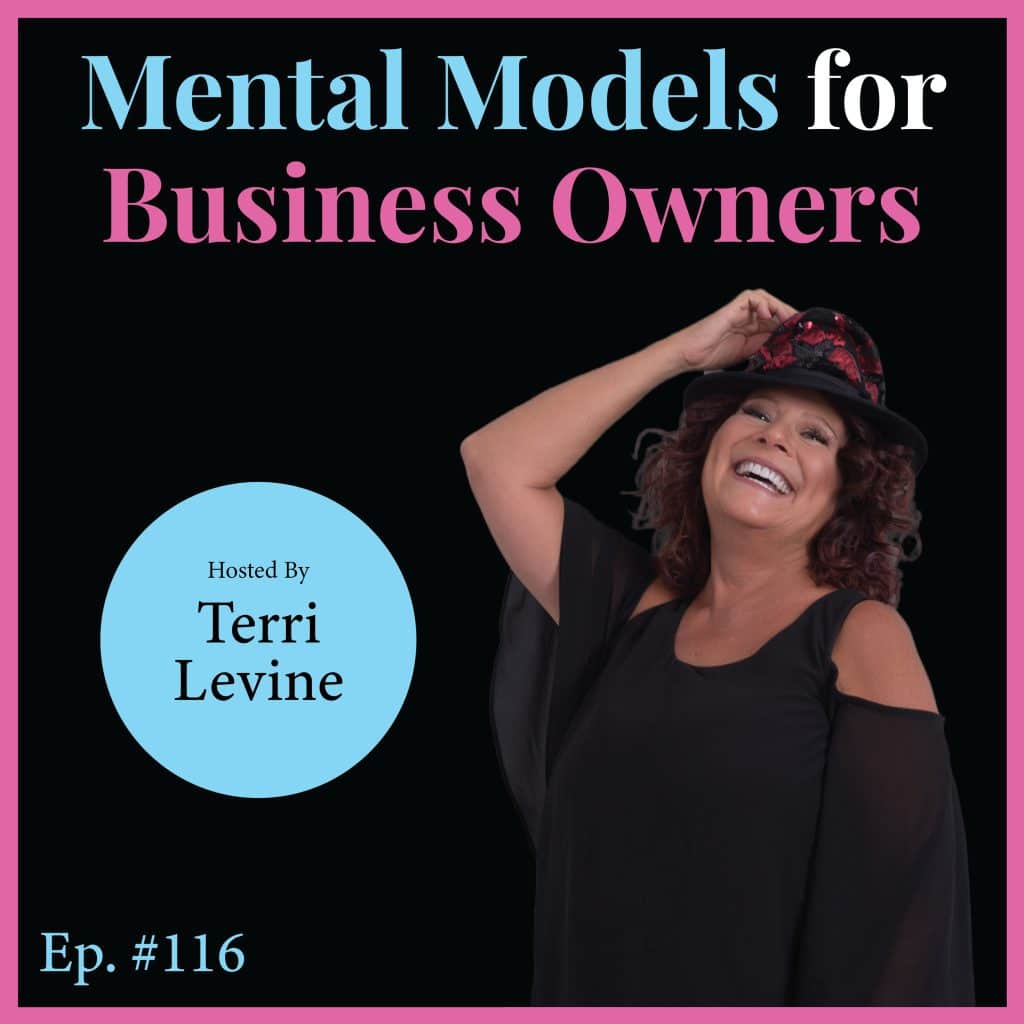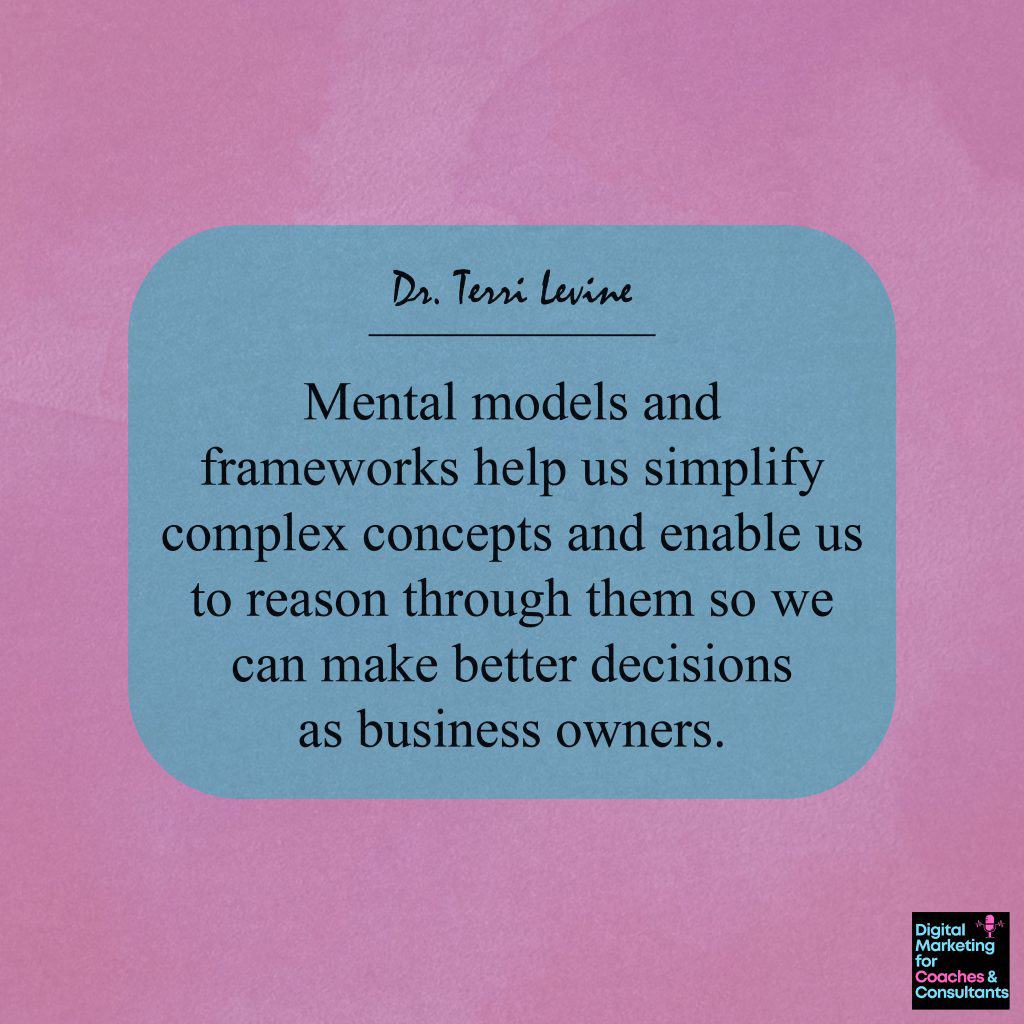Understanding the world around us involves adopting mental models/frameworks, which serve as thought processes that enable us to visualize how things work in reality. These mental models play a crucial role in assisting business owners to reason through challenges and make informed decisions.
In this episode, Dr. Terri Levine unravels the concept of mental models/frameworks, shedding light on what they are and the advantages of adopting them as a business owner.
She shares examples of using incorrect mental models, emphasizing the importance of choosing the right framework for optimal outcomes. Drawing from the book ‘Breakthrough Advertising,’ she breaks down the 5 phases of a mental model, providing a roadmap for understanding and implementing these powerful tools effectively.
Finally, she introduces us to the CRIBS framework, a valuable tool that will revolutionize your perspective on customer engagement.
Key Highlights From The Episode:
[00:40] Today’s theme: Using mental models and frameworks
[00:45] What’s a mental model?
[01:03] Advantages of having a mental model/framework
[03:25] Examples of using incorrect mental models
[04:20] The 5 phases of a mental model, as discussed in the book ‘Breakthrough Advertising.’
[06:25] Why your prospects and customers don’t actually care about your products or your competitors’ products
[07:37] Dr. Terri Levine’s CRIBS framework
Golden Nuggets:
- A mental model is a thought process; it’s a way that you can visualize how things work in reality. [00:45]
- Mental models and frameworks help us simplify complex concepts and enable us to reason through them so we can make better decisions as business owners. [01:26]
- Your prospects and your customers don’t actually care about your products or your competitors’ products; they care about outcomes. [06:25]
Let me help you grow your coaching business:
Grab this free training and see my revolutionary process in action! Join me and my Inner Circle Students for a behind-the-scenes Live Group Coaching Call: www.6figsin6months.com
If you want to join me in one of our connect and collaborate sessions. Go to https://calendly.com/heartrepreneur/mcm-live-connect-and-collaborate-session, and select a date & time!Oh yeah, feel free to join our free Facebook community here: https://www.facebook.com/groups/1024921757544017
Watch The Episode On Youtube:
Want More!?
Listen to the podcast version of this content on your favorite podcast platform: Apple Podcasts | Spotify | Stitcher | Google Podcasts
Watch all the episodes and more to gain more insight on Youtube: https://www.youtube.com/@coachterri/videos.
Please connect with me on social:
Instagram: https://www.instagram.com/mentorterri
Facebook: https://www.facebook.com/HeartrepreneurTerriLevine
LinkedIn: https://www.linkedin.com/in/terrilevine/
Full Transcript:
Hi there. It’s Dr. Terri Levine, and I want to welcome you to Digital Marketing for Coaches & Consultants. Today, I want to talk a little bit about using mental models and frameworks. And a mental model is simply a thought process. It’s a way that you can visualize how things work in reality. So, you can think of it as kind of a concept, a framework, a worldview. You carry that around with you, it’s kind of planted in your mind. And it helps you interpret the world, it helps you understand the relationships between things that are happening in the world and things that are occurring in the world.
So, I like to say that it’s a mental tool or a mental shortcut to get the best results that you possibly can. And another great advantage of having mental models or frameworks is it takes complex things and lets us reason through them and simplify them so that we can make better decisions as business owners. So, it’s kind of the crux of your best work here is take your strategies, begin to think for yourself, and make better decisions repeatedly so you can avoid more and more, quote, ‘bad decisions.’ Every decision that we’ve made that has not been the one in our best interests, we’re kind of blind to it.
And so, think of this mental process as eliminating those blind spots and giving you the ability to shift your perspective. Lots of mental models will do that for you. So, when a decision is coming at us as a business owner, we’re faced with, “What should I do?” We have to think [Inaudible 1:44] it could be, “Should I invest in ads? If so, what channel?” “Who should write the ads? Who do I hire to do the ads?” “How do I structure the ad campaign?” And then, we begin to look at things and our brain says, “Which is the easiest way?” And then, sometimes we go, “Well, let somebody else do it.” “Well, I don’t know if they’re going to do it as well as me, I’m going to roll the dice here. I’m going to gamble.”
And then, another way that we make decisions is, instead of being so logical, is to use our instincts. We use our gut feelings, we take that educated guess, and we just go from there. So, when you think about it, it can be very risky to make decisions. You could make a decision that results in you getting some negative press, or even worse, a lawsuit. Why is that? And that is because your instincts can be completely wrong, especially if you don’t have previous experience with something. You don’t have a lot of knowledge, you don’t have a lot of information. So today, I want to give you first some examples of using incorrect mental models.
So, a lot of people make marketing decisions by asking themselves, “What would I want? What would I want?” Now, this might work for you if you’re exactly the same as your customers, or what I call your client family members. So, what I want you to get is you could have very, very different beliefs, and values, and circumstances than your prospects or than your client family members. And, plus, how are you actually going to, quote-unquote, ‘argue’ with some other marketer who has the same logic and comes to a different conclusion? Who’s right? Are you right? Are they right?
So, that mental model is not the healthiest model. And, by using correct mental models, it’s a way to consistently make really good decisions and cut through the noise. So, I wanted to give you an example. In mental models, there’s a stage called the stage of awareness. And I read this in a book called ‘Breakthrough Advertising.’ It’s a much older book, I think it came out prior to 1970, in fact. And, in the book, they teach a mental model that has five parts, and it says there’s really five distinct phases.
Phase number one is the most aware phase. A prospect knows your product, your service, and only needs to know what’s the offer, what’s the deal. The product aware, it’s not the most aware, the product aware, they know what you offer and they’re not sure if it’s right for them. The third mental model is solution aware. And this is where the prospect says, “I know the result that I want, I don’t know that your product or your service actually provides that.” The fourth one is problem aware. The prospect knows they have a problem and doesn’t know that there potentially is a solution.
And the fifth one is completely unaware. They don’t even know they have a problem. So, marketing is easier the further up this ladder that you are. So, your job as a marketer is to create an engine that kind of moves people up this ladder. And, by understanding the stages of awareness that I just shared with you, your marketing helps you tremendously because you can tailor your messages to the right amount of awareness. It’s all about mental awareness. And then, you can kind of let your prospect know, “I understand your problem,” and get them curious about the solutions.
Now, marketing will look very different for each of these stages of awareness. So, for every email you write, or every ad you run, or landing page you set up, or whatever it might be, you have to understand the stage of awareness of your prospects and you have to tailor your marketing to the next stage. Our goal is to constantly move them to the next stage, the next stage, the next stage. So eventually, they will purchase your outcomes, products, and services. So, I’m going to be very transparent.
I say this to my client family members a lot, your prospects, even your customers, they don’t actually care about your product, and they don’t really care about your competitor’s product, either. They don’t care about any product. What do they care about? Is they care about outcomes. They’re asking themselves the same decision-making questions in their mental awareness, “Is this going to help me? It’s going to help me what? Is it going to help me save time? Is it going to help me make more money? Is it going to help me be more attractive? Is it going to help me impress my boss? Is it going to help me relieve this pain? Is it going to help me do something I couldn’t do previously?”
Those are the kinds of questions that they’re asking themselves. And, in my view, all marketing is, is it showing a potential prospect that, yes, you’re going to be able to do it. And if they don’t believe that, they don’t have that mental shift, they’ll avoid buying your program, product, or service. Now, there is one other point that I wanted to make today, and this is kind of a relationship that I like to make where I’m giving feedback and I have a framework. And, in this feedback, I’m making sure that I’m connecting with people at all of these levels.
And so, in my framework, I’m asking myself, does it meet what I call CRIBS? C-R-I-B-S. Let me give you my acronym. C is, is this confusing? I might have to fix it if it is. Am I repeating myself over and over again? If I am, I need to fix that. Is what I’m offering insightful? It must be insightful. Is it boring? Is it a boring video or a boring copy? And then, finally, is there some surprise element in it? So, you have to make sure that you’re not confusing people, and you have to make sure that you’re following this model.
You don’t want to be so repetitive that you get boring, and you want to give some insight to people. You want to get them with some surprise. So, those are some tips and tools that you will now have in your mental tool belt and that will really help you with your marketing. Tune in, subscribe to the show, give us a five-star review, and share the show. I’ll see you next time here at Digital Marketing for Coaches & Consultants. Bye now.





